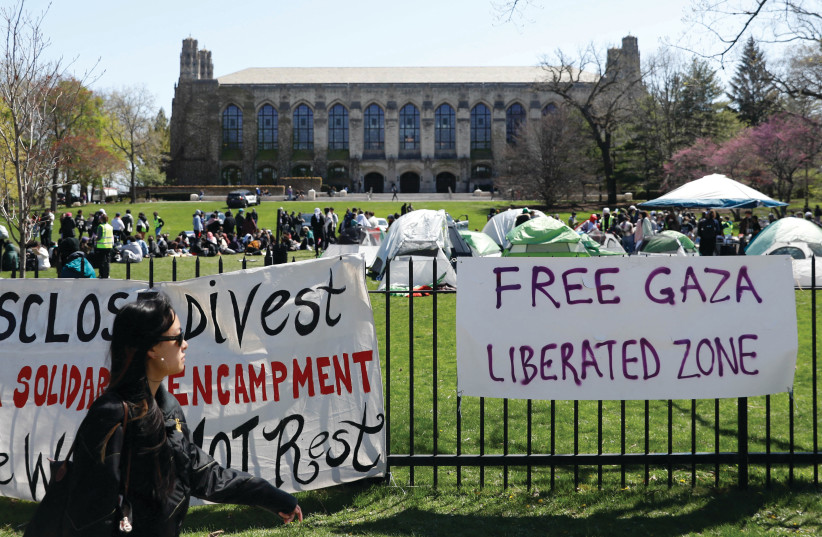Why the academy matters: Combatting antisemitism on university campuses
It is wrong to understate the importance of the university in Western society. While it is also hard to quantify immediate return on investment, the trickle-down effects on society are proven.
Mathematicians who work on obscure formulas may, one day, find applications in GPS satellites or microchips. In the humanities and social sciences, the trickle-down effect on society is also significant, if less often acknowledged.
The jargon used against Israel today was created in British universities. Scholars were the first to use the terms “ethnic cleansing” and “genocide” to describe Israeli action against Palestinians in the 1980s and 1990s.
In those years, they were written off as just a few quirks, but with time – and Qatari and Saudi funding of Middle East departments – their narrative took hold.
They were so successful that today any student taking a basic course on the Middle East will hear Israel described as an “occupier” and “aggressor. The terms genocide and ethnic cleansing have become commonplace to describe Israel in the real world.

SIMILARLY, CONCEPTS such as the “matrix of oppression” and “intersectionality,” all began at the university and have made their way into society at large.
This has come to affect Jews in the West today, regardless of their stance on or affinity for Israel. This is especially true on university campuses, where anti-Israel and anti-Jewish student activists are met with faculty and administration who are either sympathetic to their stance or cowered into silence by it.
Combatting the new trend of Western antisemitism
To reverse this trend, one needs to combat this new form of Western antisemitism in the place where it began and which continues to feed it: the university.
While there are ample scholars expositing on how demonic the Jewish state is, there are few scholars or academic papers in peer-reviewed journals questioning whether this may be a new form of antisemitism.
Until very recently, the few scholars of antisemitism worldwide focused their study on the Holocaust or earlier forms of antisemitism. No one wanted to discuss, write about, or research contemporary antisemitism in its most recent form: in its overlap with anti-Zionism.
The recently reconstituted Elizabeth and Tony Comper Center for the Study of Antisemitism and Racism is one of the very few university-based research centers dedicated to scholarship on contemporary antisemitism.
We are co-hosting with the London Centre for the Study of Contemporary Antisemitism the largest academic conference on contemporary antisemitism, which begins on Sunday in London.
The conference brings together a growing number of academics from a variety of disciplines who have recently begun to focus on antisemitism because it has become such a critical issue today. Next year’s conference will be held at the University of Haifa.
With an accomplished group of international fellows specializing in topics and geographies across the globe – from India to the former Soviet Union, from France and Hungary to North America – we are here to research, publish, and discuss antisemitism in its contemporary forms in an academically rigorous and fearless way.
The effort to create scholarship on antisemitism within the academy today is essential for the continued flourishing of Jewish communities and for the health of the academy and, by extension, Western society.
David Barak-Gorodetsky and Jacob Dallal direct and manage, respectively, the Elizabeth and Tony Comper Center for the Study of Antisemitism and Racism at the University of Haifa.





Comments are closed.